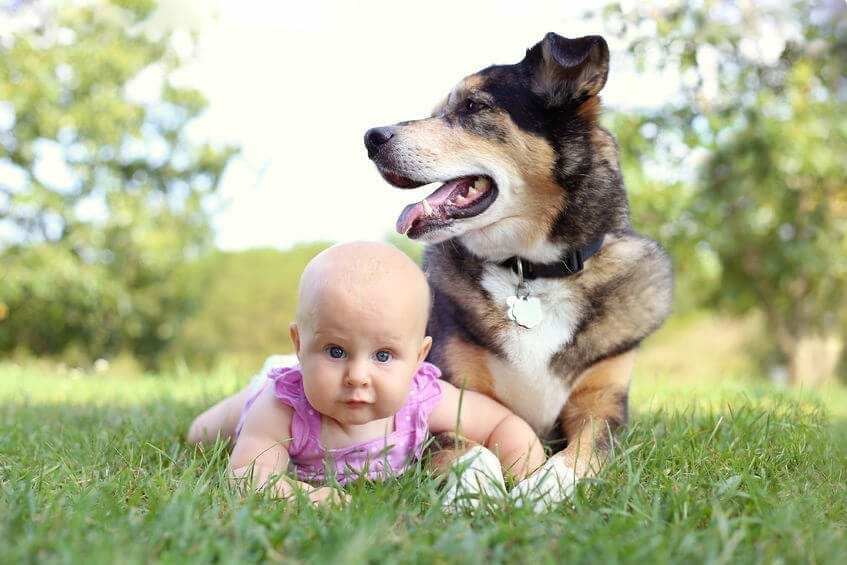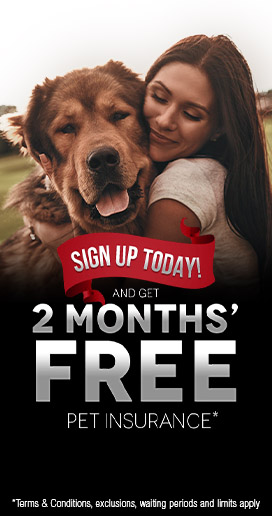
Preparing Your Pet for a New Baby
Getting ready to welcome a new baby in the house is an extremely joyous time. However, how prepared is your dog for the event? Nadia Crighton catches up with veterinarian, Dr Lewis Kirkham, the author of; Tell Your Dog You’re Pregnant to ask the important questions all pregnant pet owners should consider.
As we breeze through our ‘double income no kids’ journey many dogs are lavishly spoilt rotten with an endless supply of love and affection. Being an ‘only’ dog they normally are guaranteed 100% of your undivided attention and in some cases not even exposed to the general hustle, bustle and noise a newborn and small child can bring.
“The most important thing is to start preparing your dog as early as possible,” Dr Kirkham says. “Dog owners who commence preparation for a baby as early as possible have the most favourable outcomes. When owners do not think about preparing their dog until a few weeks or less before their due date and changes occur suddenly once their baby arrives, their dog is more likely to experience problems.”
Because of these reasons, it is paramount that you consider how to best prepare your dog for the introduction of a drooling, crying, giggling, button of cuteness. Children can be a very confusing bundle of emotions and body language to a dog who has never experienced the joy and laughter a small child can bring.
“Many problems that owners have with their dog’s behaviour are often well tolerated in a household with no children,” Dr Kirkham says. “Problem behaviours such as jumping up or barking may be acceptable now, but can be an issue when carrying a baby in the future, or if the barking disturbs the baby.”
Dr Kirkham is also quick to note that other problems such as separation anxiety or toileting can get worse when a new baby arrives, especially when loving pet parents become time-poor or routines change.
TIPS ON PREPARING YOUR DOG
- Be careful playing recorded baby sounds to your dog because if done incorrectly, it can make some dogs more reactive to the sounds. Dr Kirkham’s book discusses how to correctly play baby sounds to avoid this.
- Set realistic boundaries now, if you will be implementing new rules, it’s best to do this before the baby arrives home.
- Iron out any behaviour or training problems before the birth of your bub and call in the experts if you need help.
- Get your dog used to the new furniture and baby items including walking with the pram.
- If possible introduce your dog to a baby, safely and at a distance and gauge how they respond. If you are concerned about any of their behaviour, seek professional help quickly.
- Have a realistic routine that you can stick to when your baby is born.
Dogs feel secure and safe with firm boundaries and routines. Keeping these boundaries and routines in place is vital during times of change that a newborn can bring. Understand that your new child will have you 100% smitten and you will not be able to give your precious pup the same amount of attention you had done before your baby was born. Ensuring you keep up with routines such as your daily walk, play sessions, feeding times will help your pup adjust.
“Pregnant owners need to imagine what their daily routine will be like once the baby is born,” Dr Kirkham advises. “If finding time to walk the dog will be difficult, then organise a dog walker. If walking with a pram is likely to be problematic, purchase the pram early and start some training so that walking with dog and baby together is an option.”
Dr Kirkham has perfected the art of preparing your precious hound with 13 different baby sounds and toy noises included in his book ‘Tell Your Dog You’re Pregnant’. “Playing these sounds, gauging your dog’s response and thinking about how you can include them in these activities is important.”
When exhaustion sets in, call in the cavalry and ask for help. If you are too tired to walk your dog twice a day (as usual), enlist the help of a family member or neighbour to help out in the early days. Have a good stash of ‘thought provoking’ treats like deer antlers, food-filled toys or treat balls to keep them entertained.
“This biggest thing that can help with the transition to a larger family is to ensure the dog’s routine does not suddenly change when the baby comes home,” Dr Kirkham suggests. “The classic example is that your dog is suddenly put outside as soon as bub arrives home. Clearly, the dog is going to be very upset by this, especially if they have always been an indoor dog.”
“The first introductions are obviously important and my book describes this step-by-step and also provides advice if things are not going as well as planned. It is important to remember that they have a lifetime to be best friends and often delaying the first introductions until everyone is less stressed or bub is more settled can be advantageous.”
Dr Kirkham also advises being wary of well-meaning dog owners who give advice on how their dog ‘coped beautifully’ when they brought their baby home.
“While this may be helpful, it is important to remember that every dog is different and while a few dogs may adjust with limited preparation (e.g. only bringing the baby’s blanket home from the hospital), most dogs need a lot more time and preparation to help them to adjust.”
Get the latest Pet Insider Tips & News
We offer award-winning* pet insurance policies to protect your furry friend’s health and wellbeing. Get a quote today and give your pets the care they deserve.
Archives
Categories
- Cat Care (65)
- Cats (2)
- Dog Care (129)
- Guides (29)
- Health and Nutrition (201)
- Lifestyle and Activities (221)
- Media Release (27)
- Pet Care (251)
- Rescue Dogs (1)

